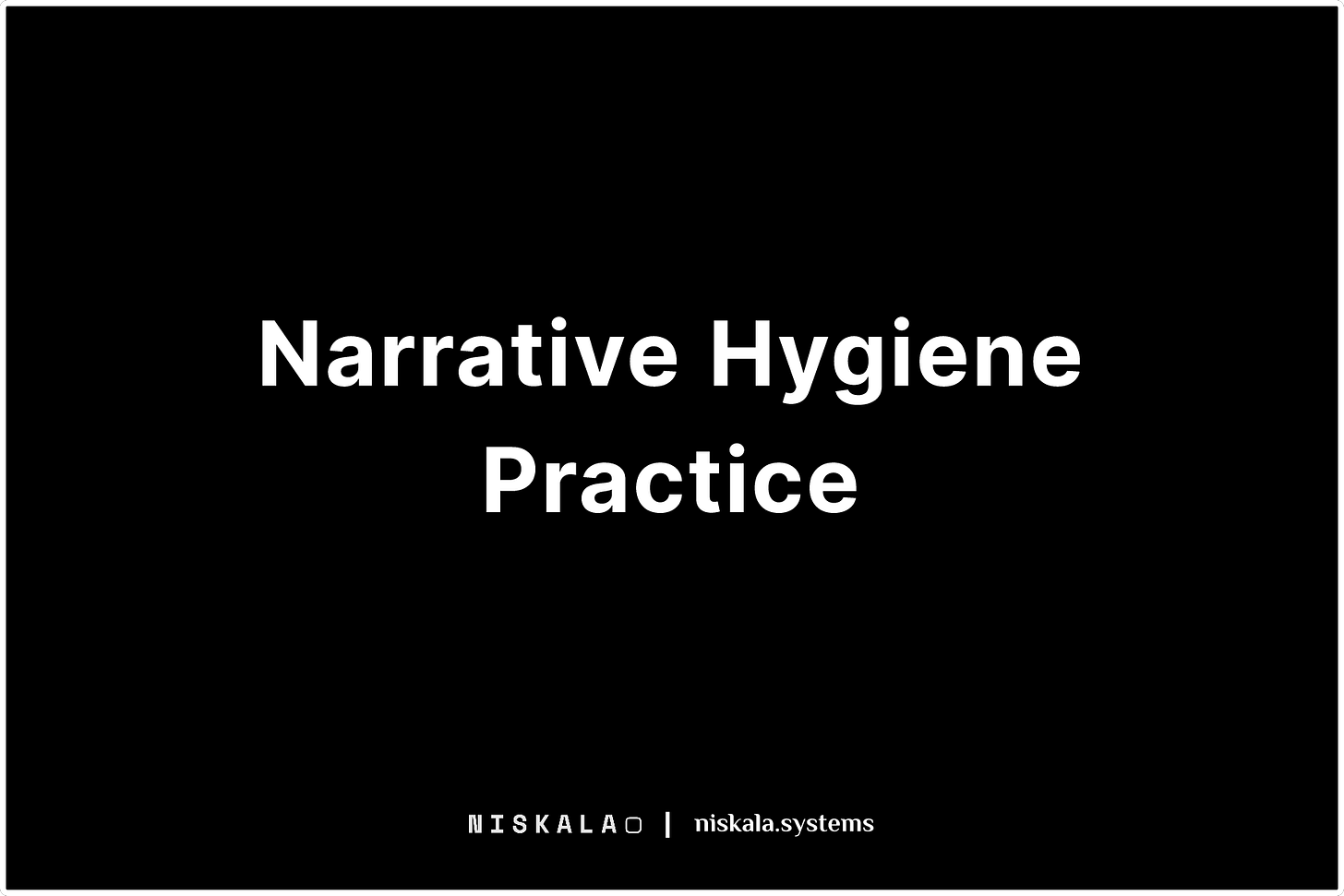Narrative Hygiene: Staying Grounded in a Manipulated Information Environment
How to maintain psychological stability when language is weaponized.
These days, most people aren’t starved for information. They’re flooded by it, yet still find themselves craving something more.
If anything, we feel overloaded, pulled between feeds, channels, updates, and takes. Everyone’s posting, everyone’s reporting, everyone’s reacting. There’s no shortage of data. But somehow, clarity feels harder to find.
And that’s the real problem: not the lack of information, but the erosion of orientation.
Because we’re not just surrounded by content, we’re surrounded by narratives. Some are natural. Some are accidental.
But many are engineered: crafted to steer our attention, shape our emotions, and redirect our trust.
And the more pressure you’re under, the more effective they become.
If you are working in design, education, policy, communication, or technology, this isn’t just someone else’s problem. You’re already inside the terrain where perception is a resource, and narrative is a form of control.
So how do you stay clear?
The answer isn’t paranoia. It’s hygiene.
What Is Narrative Hygiene?
Think of it like this: you wash your hands in public spaces not because you’re afraid, but because you understand exposure.
Narrative hygiene works the same way.
It’s the habit of checking how a message is working on you, before you act on it.
It’s the reflex to pause before sharing, engaging, reacting, or deciding.
Not because you don’t trust anyone, but because you respect how powerful influence has become.
If media literacy teaches you how to read, narrative hygiene teaches you when to step back, zoom out, and recalibrate.
It’s not about being right all the time. It’s about staying grounded when the signal feels unstable.
Five Practices for Narrative Hygiene
These aren’t rules. They’re patterns we’ve seen work in our own practice, and in the field.
They’re not about protecting your ego. They’re about protecting your ability to perceive clearly when it matters most.
1. Slow Down When Something Feels Emotionally Urgent
We all feel it: that spike of anger, that surge of righteousness, that subtle thrill of being the first to know.
Modern influence systems are built to trigger this. Not with facts, but with speed + emotion. If something hits you hard and fast, ask:
"What’s this trying to get me to do before I can think?"
Urgency is often the delivery system for distortion.
Clarity doesn’t rush.
2. Ask: What’s The Frame? And Not Just The Fact
Every message is wrapped in a frame:
What it chooses to emphasize.
What it leaves out.
Who gets blamed.
Who gets centered.
What gets repeated.
You might agree with the data, but still be trapped inside a narrative you didn’t choose.
When something seems obvious, ask:
"What frame makes this feel true?"
Because sometimes, the frame is the manipulation.
3. Be Cautious of Engineered Urgency
Not all crises are real. And even real ones can be used to collapse your thinking window.
Any message that says "act now or else" might be valid. But it also might be hijacking your cognitive space.
Especially when paired with moral pressure, groupthink, or fear of exclusion.
Remember: urgency is a tactic. Not always a truth.
4. Trace Things Upstream
By the time something reaches your feed, it’s already passed through several hands, each adding spin, speed, or subtext.
If you really want to understand a narrative, follow it back to its origin point:
Who first said this?
In what context?
What was happening around it?
"Everyone’s saying it" is not a source. Find the source. Then decide if it’s worthy of your attention.
5. Separate Resonance From Reliability
One of the hardest things to do:
Recognize when something feels true… and still check if it is true.
Disinformation rarely succeeds because it’s wildly false. It succeeds because it’s emotionally familiar. It sounds like what we already believe.
Narrative hygiene is the habit of pausing and asking:
"Do I believe this because it’s accurate—or because it comforts, confirms, or aligns?"
Clarity lives in that pause.
Why This Matters Now
Disinformation doesn’t always try to lie to you. Sometimes it just wants you to stop trusting anything. To feel exhausted. Overwhelmed. Cynical.
That’s enough to destabilize the ground beneath your thinking.
But you’re not helpless. Narrative hygiene is not about isolating yourself or distrusting everything.
It’s about maintaining a clear internal compass, so you don’t get pulled into someone else’s current without realizing it.
You can listen the podcast version of this post here:
This post was originally published on NISKALA’s Linkedin page.




